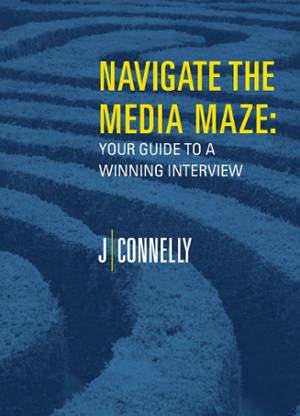 Interviews with journalists are vital for communicating your brand’s messages and news to your key audiences. As you would for any business meeting or presentation, it’s important to prepare for interviews ahead of time. When interviews with members of the media take place over the phone, they can be harder to manage. When you can’t see the person you’re speaking to, the probability of a miscommunication or misunderstanding is greater than if you can observe their body language and facial expressions.
Interviews with journalists are vital for communicating your brand’s messages and news to your key audiences. As you would for any business meeting or presentation, it’s important to prepare for interviews ahead of time. When interviews with members of the media take place over the phone, they can be harder to manage. When you can’t see the person you’re speaking to, the probability of a miscommunication or misunderstanding is greater than if you can observe their body language and facial expressions.
Below are several tips to keep in mind for ensuring phone interviews with journalists go smoothly.
Watch Your Tone
Journalists are more likely to find your insights useful, and establish an ongoing relationship with you, if you are pleasant and engaging over the phone. All they have to judge over the phone is your voice—so do your best to not only speak clearly and concisely, but also in a tone which conveys you are glad to speak with them and willing to help with their stories.
Journalists want to learn more about the people, companies, and industries they cover. They are looking for someone to teach them. When I was a student, my favorite teachers were those who took the time to make sure I understood the lessons I came to them with questions about—and if you think of phone interviews as phone lessons for journalists eager to learn more, you have the opportunity to become a source journalists will call on again and again for guidance.
Smile During the Conversation
No one can see you smile over the phone, so you have to let the interviewer know you’re happy to speak with them through your tone of voice and what you say.
If you’re having a stressful day, it can be easy to let other things affect your phone interaction with a journalist. But there is an easy way to “get into character,” as actors and coaches would say, before a phone interview—smile, even if no one can see you.
During her appearance on CNBC Make It earlier this year, Kimberly Pope, founder of the Pope Institute for Polish, Poise, and Etiquette, noted: “The act of smiling actually forces my tone to change. It’s hard to go into a more aggressive manner or to stay too direct without at least having some pleasantness in your voice.”
Stand Up to Sound More Confident
While being friendly and polite is important during a phone interview, you also need to project confidence. You have to sound like you truly believe and feel what you tell people, especially journalists who are transcribing your messages to those you serve.
People naturally feel more powerful when they are standing. Pope recommends that people stand up during phone interviews to send a message of authority: “Standing gives you more confidence, so you’re able to project more confidence.”
Introduce Yourself, and Use the Journalist’s Name
A terse greeting of “hello” or “hi”—or even worse, a terse “yes” or “yeah”—indicates the conversation isn’t one you want to be having, and will cast a pall over the forthcoming conversation.
To ensure a phone interview begins on the right foot, you should greet the journalist by name with a friendly, “Hi, [first name],” followed by, “I’m glad to speak with you.”
Be Present and Engaged
If you don’t have anything of value to say, taking part in an interview won’t automatically get you quoted in the subsequent story. It is your responsibility to deliver responses that are clear and insightful.
To ensure you can give the interview your full concentration and attention, try to take the call in a quiet place in your office or at home. If you try to conduct a phone interview while going through security at the airport, or while shopping in a mall, you won’t be as engaged as you would in a comfortable and quiet place.
Without excess noise or distractions, you have a better chance of hearing all of a journalist’s questions properly the first time, and giving thoughtful and articulate responses.
Don’t Interrupt
Nothing says “I think I’m better than you” than cutting people off on the phone. Always let a journalist complete a question or sentence before jumping in with your thoughts. To make it easier, and be certain they’re done speaking, you can silently count “one-Mississippi, two-Mississippi” before responding.
Relationships with journalists are just as crucial to a business or brand as relationships with employees, customers, and vendors. Phone interviews with members of the media should never be dismissed as “just phone calls with reporters”—they require work and effort to ensure they help you effectively communicate with your key audiences.
For more interview tips, download our free ebook and find out how to navigate the media maze:




Let’s Connect
Ready to build, grow, manage and protect your brand? Complete the form below to discuss how we can help.